#western science
Text
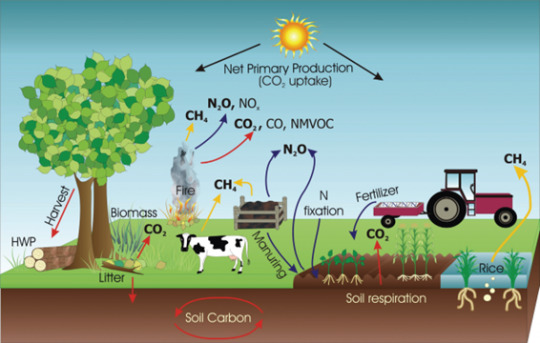
I love science. But also, I can clearly see how it is the western man’s explanation of explicit indigenous knowledge. ESPECIALLY in agriculture and food systems. Isn’t it quite interesting to think about how regenerative agriculture was THE way of living. We’ve strewn so far from this form of food production that now rich white women with masters degrees and inherited land get to teach others “regenerative agriculture” for profit. It irritates me that our culture (mostly white culture) needs the chemical, biological, physical, scientific proof that something works when oral traditions have been tried and true on this continent for 10,000 years. Is the scientific method a means of distraction so big ag, big pharma, big oil, and big chem can make a profit?
#the circle of capitalism#western science#indigenous knowledge#same language#agriculture#regenerative agriculture#indigenous voices#food systems#native rights#sustainability#fuck capitalism#life#wicked witch#green anarchy#the wicked witch of the east#why does tumblr hate me#big ag#small ag#circular#solarpunk#profit#profit to the people#united we stand
44 notes
·
View notes
Text
The fact is that two-spiritedness, homosexuality, bisexuality, and transgender are at the forefront of some of the most significant scientific re-visionings of our time – in which the gap between indigenous and Western perspectives is finally being bridged – yet their contribution is rarely, if ever, acknowledged by Western scientists. When prominent chaos theoreticians, biodiversity experts, and post-Darwinian evolutionists invoke the teachings of tribal peoples, they are usually unaware of the pivotal role played by homosexuality and transgender in these indigenous belief systems, or in the lives of the writers, storytellers, and visionaries who give poetic voice to their scientific concepts.
"Biological Exuberance: Animal Homosexuality and Natural Diversity" - Bruce Bagemihl
#book quote#biological exuberance#bruce bagemihl#nonfiction#two spirit#homosexuality#gay#lesbian#bisexual#transgender#forefront#indigenous knowledge#traditional knowledge#western science#chaos theory#biodiversity#post darwinian evolution#acknowledgment
2 notes
·
View notes
Text
Blog 5 - My personal concerns regarding western colonialism in nature interpretation
This week, we were given free reign to write about whatever occupies our minds for our weekly blog. In all honesty, this freedom to write whatever I am truly thinking makes me feel unsettled and quite scared. That being said, my topic of choice this week is the tendency to become constricted to western ways of thinking and environmental science.
I am afraid that the career path which I have chosen is riddled with western industrial and colonial biases, something which we have covered briefly in this blog. In a nature interpretation setting, you are brought in and told that you are going to go out and explore nature, come to your own conclusions, but often these interpretations are already made for you by whoever is running the program and by the western capitalist framework with which our society runs.
There is so much knowledge regarding the environment, be it properties of plants, changes in weather, tracking animals, which has been accumulated by various cultures around the world. I feel constricted by the education provided to me as it is at its core centred around western environmental science. The scientific method itself, which is something which almost all of my courses have gone over at some point, is a great way of investigating natural phenomena, however, it is just one way for us to draw conclusions about nature.
Everything that has been taught to me is coming from a western colonial perspective and a capitalist framework. This is the same frame of thought which upholds structures which seek to oppress people like me—a brown muslim woman–and so many others around the world by upholding structures such as white supremacy, patriarchy, ableism, islamophobia, and so much more.
While I recognise my privilege in being close to completing a degree in a STEM field, it saddens me that the knowledge which I am leaving with is so limited and so riddled with western bais.
I find the idea of myself guiding groups of people–composed mostly of settlers–on stolen Indigenous land, telling them things which might be wrong, and which have already been known by Indigenous peoples for thousands of years. These types of programs–and in my opinion, all programs, legislators, and government agencies–should be majority Indigenous-led.
While this has been something I have been thinking about for the past few years, as my degree in Zoology is coming to a close, I feel an obligation to communicate these thoughts and concerns, take advice from indigenous nature interpreters on their thoughts about non-indigenous nature interpreters and the best way to go about it without integrating western bias. I am able to recognize that I am an individual living in this system, trying to make a living while pursuing my passion, and recognizing the issues present within the industry I am entering is an important first step.
0 notes
Text

All Along The Western Veil
10K notes
·
View notes
Text
Important as these findings are, indigenous perspectives on animal (and human) homosexuality/transgender have a significance for Western science that extends far beyond the details of specific behaviors in particular animals.
"Biological Exuberance: Animal Homosexuality and Natural Diversity" - Bruce Bagemihl
#book quote#biological exuberance#bruce bagemihl#nonfiction#indigenous perspectives#indigenous knowledge#traditional knowledge#homosexuality#gay#lesbian#transgender#western science#animal behavior
0 notes
Text
Other examples are summarized in the table below.
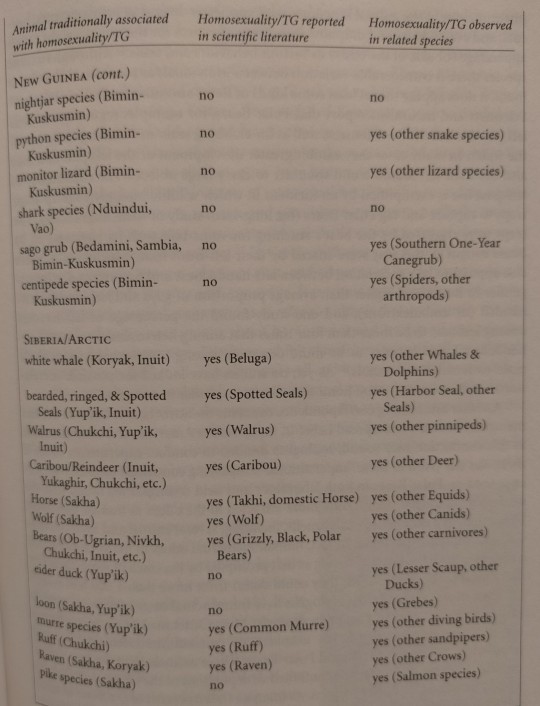
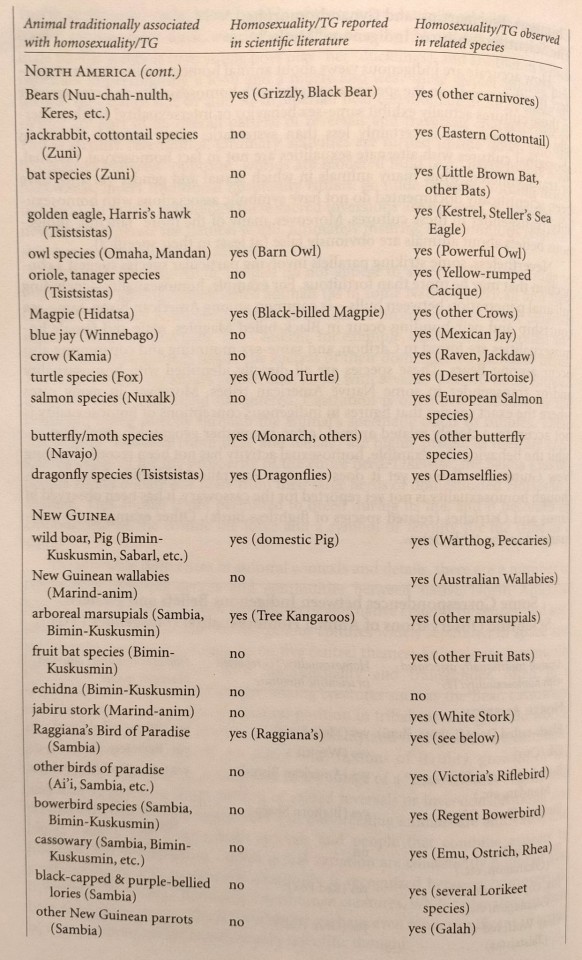
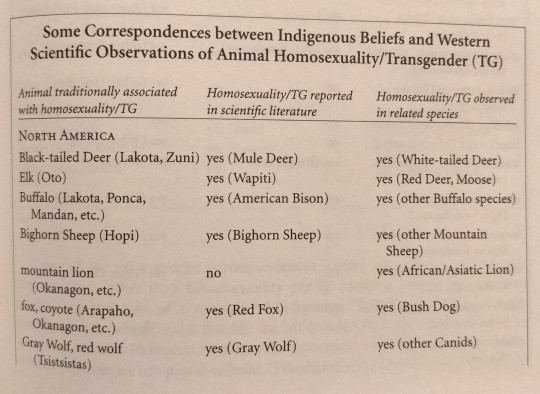
"Biological Exuberance: Animal Homosexuality and Natural Diversity" - Bruce Bagemihl
#book quotes#biological exuberance#bruce bagemihl#nonfiction#correspondence#indigenous beliefs#western science#observations#homosexuality#gay#lesbian#transgender
0 notes
Text
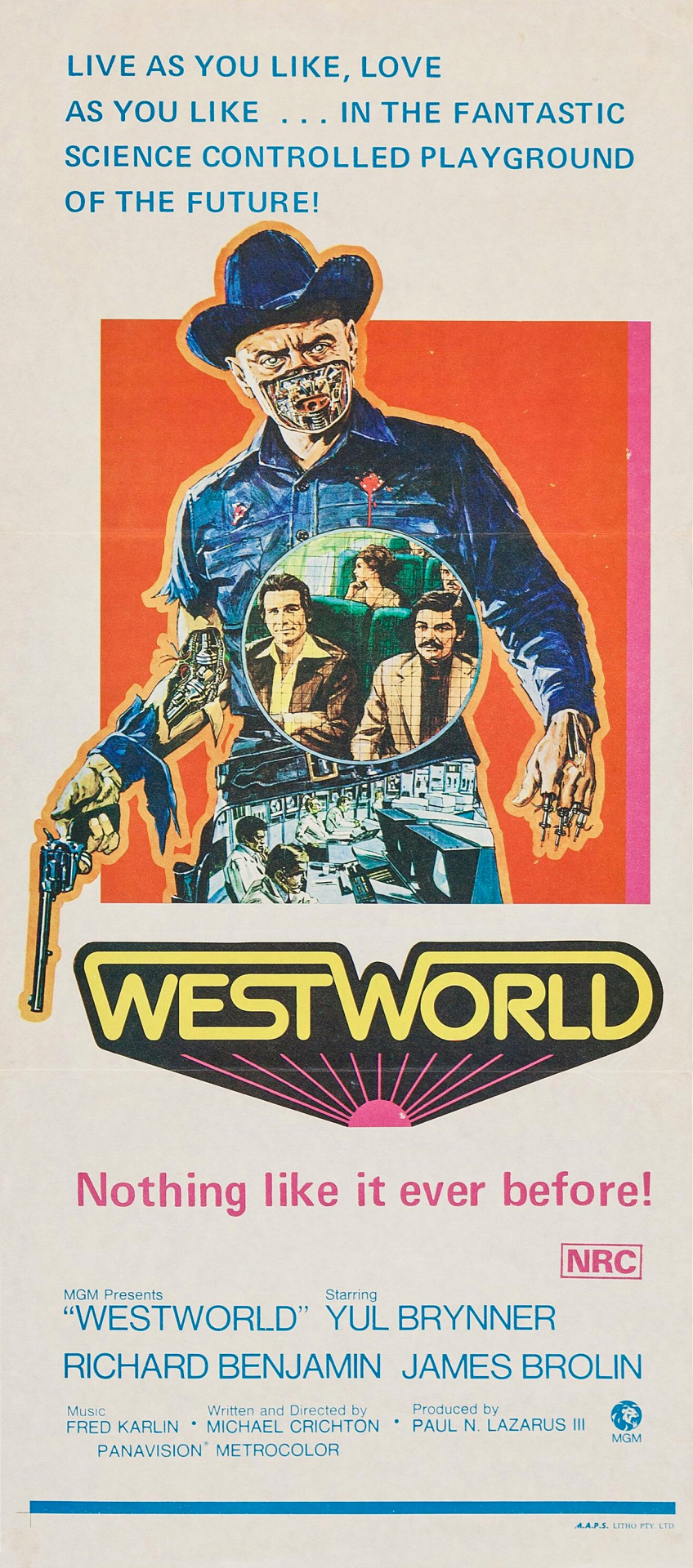
Westworld poster from Australia, 1973. Art by Neal Adams.
592 notes
·
View notes
Text
Blinded by reductionism
Blinded by reductionism and our inability to understand and appreciate the complexity in nature
I wrote about the weakness of reductionism about 18 months ago [see ‘Reduction in usefulness of reductionism‘ on February 17th, 2021]. Reductionism is the concept that everything about a complex system can be understood by reducing it to the smallest constituent part. The concept is flawed because complex systems exhibit emergent properties [see ‘Emergent properties‘ on September 16th, 2015]…

View On WordPress
#complex systems#complexity#ecosystem#ecosystems#emergence#emergent properties#forests#reductionism#Suzanne Simard#trees#Western science
1 note
·
View note
Text

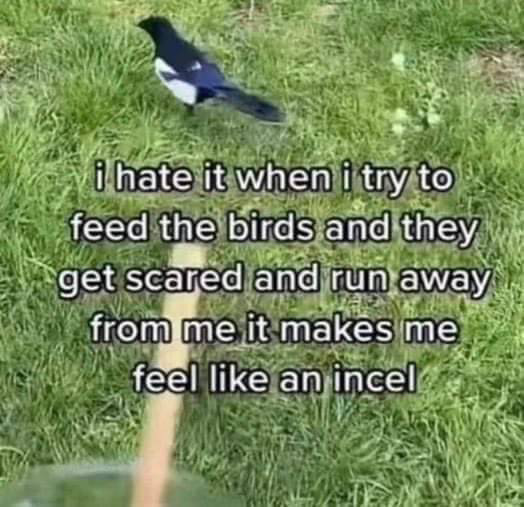
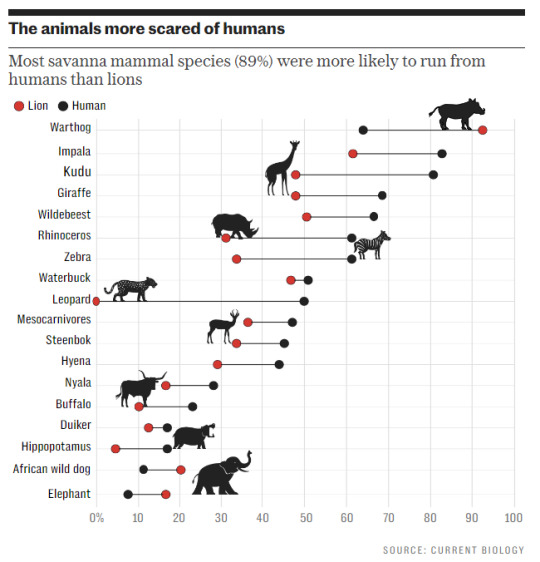
Report Excerpt
Lions here typically kill prey at waterholes, and hunters often also do so. "Our experiment entailed animals at waterholes hearing in close proximity (∼10 m) either lions (snarling and growling), humans (women and men speaking calmly in locally used languages) hunting sounds or non-predator controls, all broadcast at the same volume (60 dB).
Fear of humans significantly exceeded the fear of lions throughout the savanna mammal community. Considering the community as a whole, wildlife were twice as likely to run and abandoned waterholes during the dry season in 40% faster time upon hearing humans compared with hearing lions.
#human super predator#super predator#current biology#liana zanette#biology#keep wild animals wild#science#western university#zoology
403 notes
·
View notes
Text

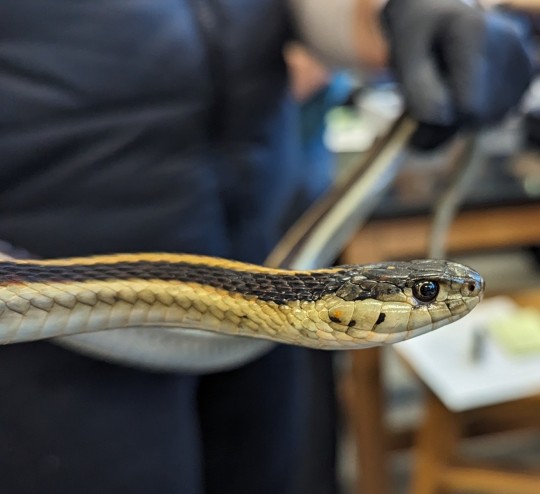

I was so, so lucky to meet a very special trio of snakes for a class I'm taking on methods in field ecology. One of my two professors is a specialist in garter snakes and was kind enough to bring three different species in for us to compare in person and observe up close. The first was the gorgeous common garter snake, Thamnophis sirtalis, pictures above. She was so calm and well-mannered!



Next was this tiny (by comparison) T. elegans dude, a western garter snake, who was wary of the camera but very patient about being passed around by a group of excited college students. He matched my classmate's sweater perfectly!

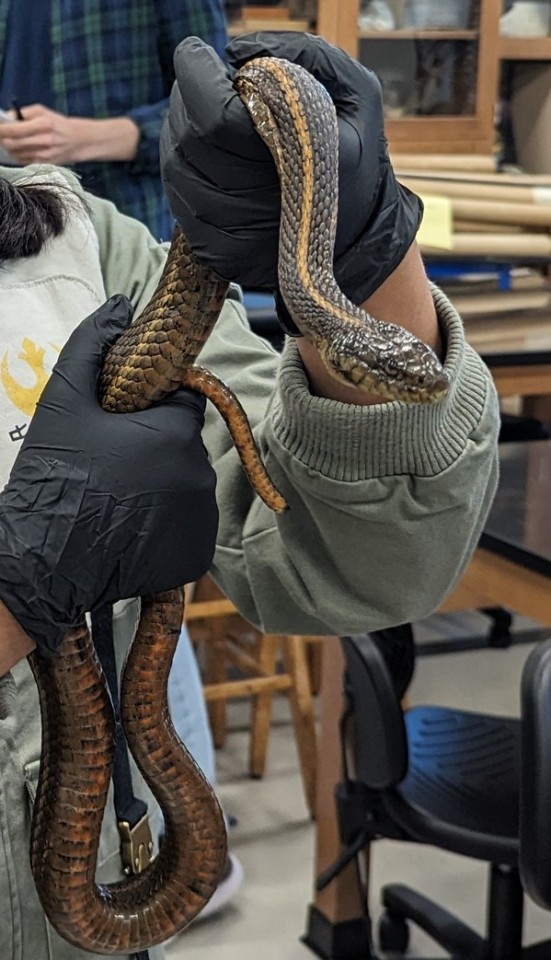

Finally, an endangered and incredibly precious T. gigas, the giant garter snake. She's about half of her maximum adult size, so a giant indeed! She musked and peed a bit but for the most part this gojira-faced beauty was pretty chill. We got to observe a full work-up for her including documenting records and microchipping.
She's one of the last of her species. Despite Herculean efforts by her protectors and conservation experts (mostly just one man and his dedicated team), this is a very difficult species to observe in the wild and their habitats are disappearing faster than their need for prioritization of protection in a given area can be assessed. These snakes rely on riparian habitat near rivers, which is also unfortunately a favorite for human development. At this time we don't know how exactly many giant garter snakes are left or whether their current populations are stable.
Today we got to visit their marshland habitat and watch these three go back to the place where they were caught. It was a huge honor and something I'll carry with me forever.
#snake#snakes#reptile#reptiles#reptiblr#garter snakes#garter snake#native species#we put that thing back where it came from or so help me#so help me!#science#ecology#endangered species#giant garter snake#western garter snake#common garter snake#when i got home i ate a salad so big that it made me sleepy
466 notes
·
View notes
Text
Did you MIDST us?
Oh hello! Long time no see, or hear as the case may be. Speaking of which, did you hear an all-new season is hurtling towards us like a certain falling moon this Wednesday on YouTube and your favorite podcast apps? Naturally we had to return to the place the tangled tales of our crotchety outlaw, freakishly virtuous cultist, and diabolical basta-, er, businessman began to celebrate… Right here on Tumblr!
To ring in the final season, join us right here TOMORROW, Feb 13th, for a special behind the scenes AMA with the series creators, Third Person! Join 🔮Sara, 🎷Xen, and Matt 📜 all day long as they answer your burning questions submitted right here on our ask page.
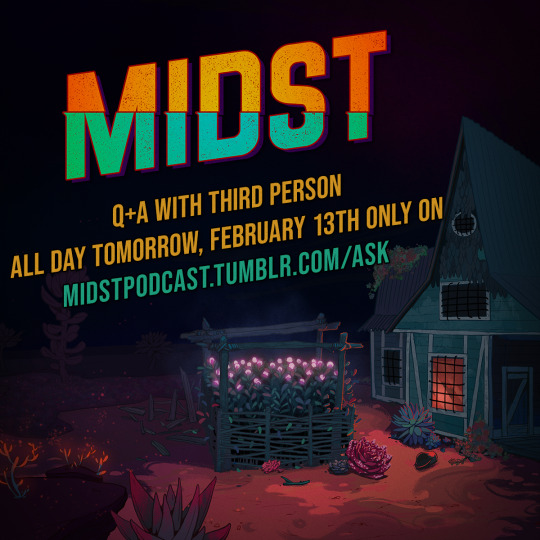
There’s plenty in store this season and beyond - so be sure to follow and check back for updates, and join us over at Midst.co where you can find behind the scenes extras, be the first to hear new episodes, and view in world appendices that expand the story of our doomed spinning sphere. Now, let’s blow the dust off this old blog and rev our submersible engines for an all new journey into MIDST!
#midst podcast#midst#podcast#podcasting#scifi#science fiction#fantasy#western#soundscapes#music#moc weepe#jonas spahr#phineas thatch#lark#imelda goldfinch#Kozma Laszlo#valor#original story#fiction podcast#audio drama#audio fiction#trailer
177 notes
·
View notes
Text
The History of Cyberpunk
Or why every other SciFi Genre is called [something]punk

You know what? Let's do this. Because I have seen the discussion on whether or not Solarpunk is "punk" over the last few days and... people really gotta learn their history.
The first time a genre took the "punk" name was Cyberpunk. And for context we gotta talk a bit about the history of the Cyberpunk genre.
While some books that we in hindsight call "Cyberpunk" were released as early as the 1960s, the start of Cyberpunk as a genre got its start in the late 70s and early 80s.
The term was invented by Bruce Bethke, who published a short story in 1983 with the name "Cyberpunk". His idea was to juxtapose the term "punk" for both the mentality and the punk protagonists in his short story with the term cyber, short for the cybernetics they were wearing. And while the cybernetics have become a main stay in the genre, the punk attitudes are not always carried through...
Well, the title Bethke invented stuck, though. When 1984 Neuromancer was published, one of the most influencial works in the early days of the genre, he called it "a Cyberpunk novel" in the marketing. And from there... Well, the genre was suddenly named like that.
The 80s were definitely the decade that had the most influence on the genre, given that a lot of the big novels and graphic novels of the genre were released here.
A big influence was, no doubt, that 1982 the Blade Runner movie had released and had inspired quite a few writers and artists. (And yes, this makes Blade Runner a movie that released not only before the term Cyberpunk was coined, but also before the genre had a chance to define itself.)
Given that the genre was defined in the 80s, there are a lot of 80s anxiety kept within it about the rise of the Japanese economy, that are these days rarely questioned within the western Cyberpunk movement.
When the genre was coined and developed, Japan was the fastest growing economy in the world, being so influencial that they got to buy out several things in America. Something that kinda jerked white people in the US a lot. This is, why Cyberpunk originally depicted not only a capitalist hellscape - but specifically a capitalist hellscape were everything was bought out by Japanese companies, with many of those early antagonists being Japanese companies. And yeah... there was a lot of both anti-japanese racism, but also cultural appropriation of Japanese things in early Cyberpunk, at time surviving to this day. (But that is a story for another day.)
The general sense that Western Cyberpunk had, was always the idea of: We have a capitalist hellscape where the world is slowly dying and people are exploited with no end, while we have those kinda punky protagonists, who stand outside of the society and try to work against it. This being where the punk comes from.
Now, I could talk for length about how a lot of that punky attitude has been lost in more modern Cyberpunk media, but that, too, is a story for another day.
So, let me just talk about what happened then.
The term Cyberpunk really is darn catchy, right? So just when that name took hold, writer K.W. Jeter retroactively called his 1979 novel Morlock Night "steampunk". And guess what: This stuck, too. Though while the 80s Cyberpunk still stuck to the punk attitude, a lot of Steampunk did not. While for certain there is quite a bit of Steampunk that has kinda punky characters go against the quasi Victorian society of steampunk books (something most common in the air pirate novels I have read), a lot of other stories are more focused on a general sense of adventure.
But never the less... The genre names stuck and gave a nice baseline for naming other genre. We got Dieselpunk, Atompunk, Nanopunk, Arcanepunk, Dustpunk, Silkpunk and of course also Solarpunk and Lunarpunk.
And for the most part... The "punk" names mostly communicate: "It is SciFi with this kinda aesthetic/twist going on". Which is just how it turned out.
Funnily enough Solarpunk is for once a genre that brings back the punk, as it tends to include a lot of the ideals aspired to by the Punk counter culture of the 1970s: Anarchism, anti-capitalism, anti-consumerism, anti-classism, anti-racism, anti-colonialism and so on. Though other than with Cyberpunk and the real world punk movement, Solarpunk for the most part imagines a place, where those things are culture instead of counter culture.
I personally find it kinda sad, how for the most part Cyberpunk kinda lost a lot of the counter-cultural, revolutionary mindset. And how fucking defeatist the genre often is.
But again, it is a story for another day. Just as the story of Japanese Cyberpunk is.

#cyberpunk#solarpunk#steampunk#cyberpunk history#western cyberpunk#science fiction#scifi#william gibson#neuromancer#genre history#punk
427 notes
·
View notes
Text
If Western science is to embrace indigenous perspectives – as it should – then it must do so fully, including views on homosexuality/transgender.
"Biological Exuberance: Animal Homosexuality and Natural Diversity" - Bruce Bagemihl
#book quote#biological exuberance#bruce bagemihl#nonfiction#western science#indigenous perspectives#indigenous knowledge#traditional knowledge#homosexuality#gay#lesbian#transgender
0 notes
Text
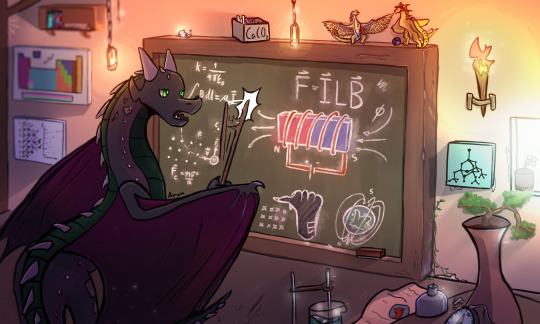
Physics and Chemistry are hard, especially when the subject is so abstract you probably won't be able to even try to understand it. I took a test on Electromagnetism and Stoichiometry recently, so they still linger on my mind.
I had this idea of incorporating real-life, the boring science stuff, into fantasy which is more interesting and forgiving and also includes dragons.
Bonus point if you can point out all the references, sciences or fandoms.
#dragon ocs#wings of fire oc#fantasy dragon#my art#dragon art#dragon#dragons#derg#dragon artist#dragon oc#western dragon#feral dragon#dragonposting#dragonsona#wings of fire#wof oc art#wof art#wof nightwing#science#electromagnetism#physics#stoichiometry#chemistry#fantasy drawing#nightwings#dragon posting#fantasy art#angels with scaly wings#golden treasure: the great green
271 notes
·
View notes
Text
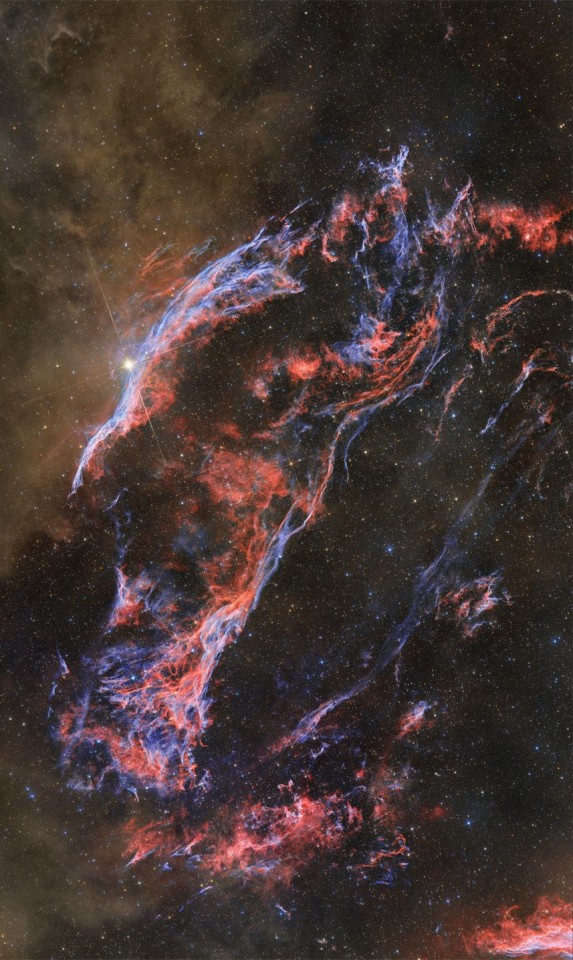
Dusty Western Veil
3K notes
·
View notes
Text
I did the basic genres (yea I know there’s tiny sub genres, but these are the defined basic genres of film + I added fantasy)
was curious about everyone else’s since mine is obviously horror (my letterboxd is serenditpity)
#movies#letterboxd#polls#horror#drama#thriller#fantasy#science fiction#romance#comedy#action#mystery#western
137 notes
·
View notes